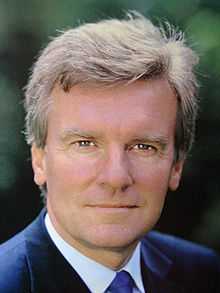Ulrich Daldrup

Youth
Daldrup was born in Porta Westfalica, Germany, and grew up in Brussels, Belgium where his father Franz Daldrup had been delegated in 1958 by then German Minister of Economic Affairs, Ludwig Erhard, to set up the European Economic Community (later: European Commission). After his baccalaureat at the European School in Brussels he made an apprenticeship in banking with Banque des Bruxelles-Lambert. In 1971 he finished his study of chemistry and of economics at the Technical University of Aachen with two Masters degrees/Diplomas (in chemistry and in economics) and a PhD. In 1972 he married Elfi Herrny.
International career



Political career
From 1994 until 1999 he served as the Mayor of the city of Aachen. From 1993 till 1999 he was also head of the CDU in Aachen. He was co-founder of the Maastricht-based Euregio Council and the Euregio EVP. He was President of the Mittelstandsvereinigung till 2005. In 2004 Daldrup founded the international "Business Club Aachen Maastricht", whose President he remains. In 2006 he was appointed vice-President of the humanitarian Water for the World Foundation, whose headquarters are in Maastricht.
Academic career
Since 1984 Daldrup has been teaching international law and business administration at the University of Applied Sciences of Cologne, where he is appointed as Professor. The University of Aachen appointed him as Lecturer in 2004 for "International Management". From 1996 to 1999 Daldrup was Dean of the University of Bradford/NIMBAS, MBA Campus of Aachen. Daldrup was lecturer at the Kaunas Technical University in Lithuania, where he created the first Technology Center/Incubator. For this he was honoured with the Doctor Honoris Causis in 2000. Daldrup also gave lectures at the University of Stettin in Poland and Georgetown University, United States. The emphasis of its research is regional development and policy, European treaties and international cooperation.
He has published a number of books on international cooperation.
Distinctions
- “Doctor Honoris Causa” by the Technical University of Kaunas
- “Bundesverdienstkreuz am Bande” of the Federal Republic of Germany
- "Order of Merit of the Federal Republic of Germany"
- “Honorarprofessor” of the University of Applied Sciences of Cologne
- “Ehrentaler” of the Handwerkskammer Rhein-Main
Publications
- Economic Guide Nigeria
- Economic Guide ECOWAS Countries
- Economic Guide Sri Lanka
- Economic Guide Bangladesh
- The Industrial Sector in Cameroon
- The Industrial Sector in Chad
- Ernährungssicherung und Nahrungsmittelhilfe - ein Instrument der Entwicklungshilfe
- Handicraft in Mauritius
- Handicraft in Morocco
References
- ↑ "Prof. Dr. Ulrich Daldrup". The Institute for Technology and Resources Management in the Tropics and Subtropics. Retrieved 7 February 2012.
External links
- Official Webpage
- Ulrich Daldrup in the German National Library catalogue
- http://www.aachener-nachrichten.de/news/wirtschaft/business-club-aachen-maastricht-ehrt-reinhold-wuerth-1.339264
- http://en.ktu.lt/content/about-ktu/honorary-doctors
- http://campus-info.noc.fh-aachen.de/campus/all/lecturer.asp?gguid=0x9477FF372CF4E54BAB4AE29D7AEB66F0&tguid=0xE7EFE18DF893F04F80C0615E53BDE9E5
- http://www.energyhills.eu
- http://www.businessclub-aachen.com
- http://www.gfe.de
|